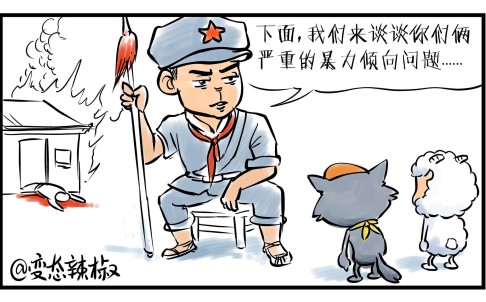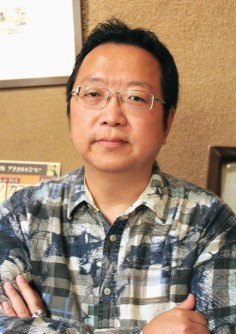Chinese cartoonist Wang Liming stays in Japan amid fears for safety
Satirical cartoonist decides not to return to China because of fears for his safety and crackdown on freedom of expression there
PUBLISHED : Thursday, 06 November, 2014, 9:55pm
UPDATED : Friday, 07 November, 2014, 10:50am
Kyodo in Tokyo

A Wang cartoon evokes the 1974 patriotic film Shining Red and the television animation Pleasant Sheep and Big Big Wolf. Photo: SCMP Pictures
Prominent Chinese cartoonist Wang Liming has begun a new life in Japan out of fears for his safety and intensifying restrictions on freedom of expression at home.
Wang, 41, known as "Rebel Pepper," has gained prominence via social media since releasing sarcastic and critical works about Chinese politics online in 2009. He has about one million followers on Weibo.
His path to a new life in Japan began unexpectedly. During a trip to the country in May - his first journey outside China - he released some caricatures about the courtesy of Japanese and other favourable impressions of the country. But trouble started when his artworks were denounced by a website linked to the official People's Daily.

Chinese cartoonist Wang Liming
The party mouthpiece posted a column criticising Wang as a pro-Japan traitor on August 18, and the column was carried by several other Chinese websites within a few hours.
He was ousted from social media networks, with his Weibo account becoming inaccessible, and he received a number of email threats that he would be killed if he returned to China. Wang said he gave up on returning to China within the past month.
"I thought I'd be detained at the airport and felt fear for my physical safety," Wang said. He added that he was also worried about the safety of his wife who was accompanying him.
Wang has obtained work as a researcher at a university in the Kanto region of greater Tokyo with the help of his supporters. He has begun studying Japanese and continues to draw cartoons.
China watchers said President Xi Jinping's administration saw freedom of expression in cyberspace as a threat and drew up seven "bottom line" rules prohibiting criticism of the party in the summer of 2013.
Authorities have been closing websites of bloggers dealing with social issues and detaining them.
Wang received a number of warnings about his cartoons and was detained and subjected to a midnight raid by authorities after drawing cartoons on issues such as the territorial disputes between Japan and China, and the pro-democracy movement in Hong Kong.
After one period of police detention last year, Wang responded by posting a series of sketches depicting his treatment. They showed the cushioned walls and uncomfortable steel chair in the police interrogation room, and the small, spartan cell in which he spent the night.
"Their way of taking away people's freedom of expression and persecuting them for one-sided reasons suggest a return to the Cultural Revolution period" from 1966 to 1976, he said.
"I realised how wonderful freedom is while in Japan," he said.
"I wonder why [I have to be called] a traitor for conveying thoughts on Japan as I felt," Wang said. "We're not allowed even to make a joke about the government and bureaucrats. I'm pessimistic about the future of China."
Wang discussed the motivations behind his satire when he spoke to Post Magazine last year. "They [the police] tried very hard to find out if my unruly comments online were propelled by a certain overseas anti-China force," Wang said.
"But the expressions were made only out of my impulse to comment on current affairs."
